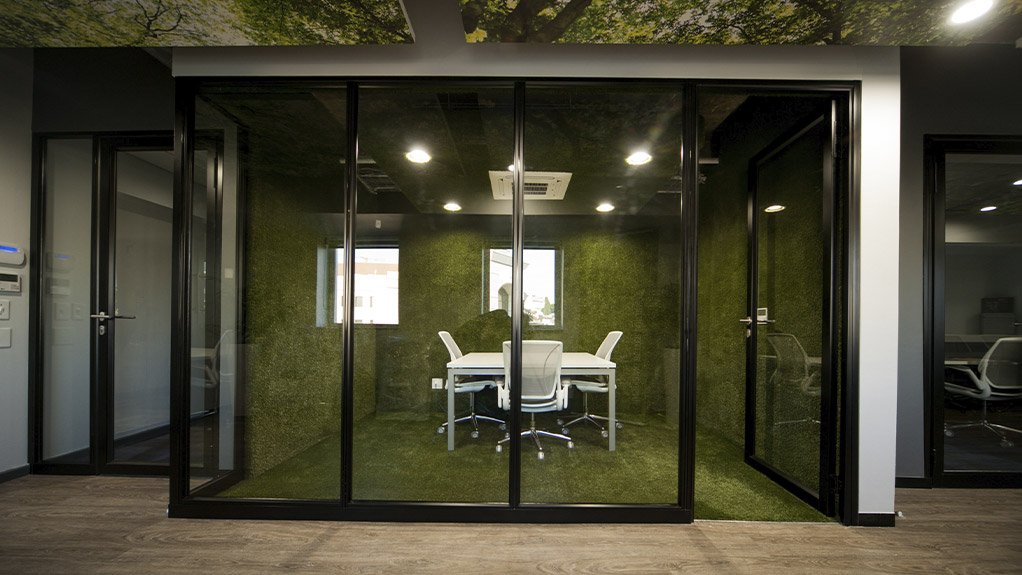Green light for ‘net zero’


RATINGS The GBCSA Rosebank office received a 4-Star Interiors Rating based on the assessment of the environmental attributes of the building’s interior fit-outs
Following then Energy Minister Jeff Radebe’s announcement paving the way for small projects generating between 1 MW and 10 MW of their own renewable electricity to feed it back into the grid, green building consultants ecocentric see this as a crucial opportunity for companies to accelerate becoming ‘net zero’ carbon.
“Globally, buildings are responsible for more than 30% of carbon emissions and driving net zero carbon presents a major opportunity for the built environment to reduce global carbon emissions,” says green building consultants ecocentric owner Jutta Berns-Mumbi.
“The challenge lies in substantially accelerating reduction in carbon emissions of the existing building sector - and doing so as soon as possible, aiming for 2030”, she adds.
A net zero carbon building is a highly energy efficient building, where the energy demand is met by on-site and, where necessary, by off-site renewable energy, resulting in zero net carbon emissions on a yearly basis.
The Green Building Council of South Africa (GBCSA), established in 2007, recently released a Net Zero Certification Scheme for new and existing buildings, which follows the same rigorous certification process as the Green Star SA building certification tools that the GBCSA has released over the past few years. The scheme affords new and existing building projects the chance to showcase their net zero achievement through an independent assessment.
The net zero scheme ties in with the C40 South Africa Buildings Programme – launched in April 2018 – which aspires to make zero carbon buildings standard practice across South African cities. Tshwane, eThekwini, Johannesburg and Cape Town are participating.
Green Building Energy Strategies
Embedding green building energy strategies into new buildings is achieved through sustainable architectural designs using ambient energy instead of conventional energy.
“An effective approach to energy consumption optimisation and reduction in buildings must be two pronged, requiring a combination of passive and active methods,” explains ecocentric senior sustainability consultant Shabari Shaily-Gerber.
The passive methods typically respond to the micro and macro climate of the building and may include architectural interventions that address building orientation, glazing area and opening exposure, and external and internal shading, among others.
She adds that residential buildings in particular have a huge potential to harness contextual site features such as wind patterns and solar path for passive design due to a relatively low heating and cooling load and perforated facades as opposed to the traditionally sealed office and retail buildings.
“Across the building sector, these interventions, if implemented through informed decision-making, will result in maximised daylight access, natural ventilation for thermal comfort and reduced cooling and heating load.”
She notes that such features further reduce the capital cost investment in active methods that include building insulation; high-performance glazing; efficient heating, ventilation and air conditioning; and domestic hot water and lighting systems. If integrated at the pre-design phase of a project, such an approach can result in a significant reduction in operational cost of the building and impart long-term resilience to the building systems.
Waste
Zero waste management strategies for business and home form a further crucial part of driving a net zero agenda. Reducing the generation of waste in the first place and targeting high recycling and composting rates is key: “Sorting food and other compostable waste from other waste and preventing food waste from going to landfill has a significant impact on reducing carbon equivalent emissions: organic waste releases methane gas, which is a 22 times more potent greenhouse gas than carbon dioxide,” Berns-Mumbi says.
Coupled with developing innovative technologies, “dealing with the remaining waste streams that are currently not composted or recycled, is a major opportunity for net zero”.
ecocentric have already started working with established real estate investment trusts on the development of net zero carbon, water and waste strategies that will see some of South Africa’s premier retail and office spaces driving an ambitious net zero programme by 2030. ecocentric is planning to roll out similar strategies with its local and global client base.
Article Enquiry
Email Article
Save Article
Feedback
To advertise email advertising@creamermedia.co.za or click here
Announcements
What's On
Subscribe to improve your user experience...
Option 1 (equivalent of R125 a month):
Receive a weekly copy of Creamer Media's Engineering News & Mining Weekly magazine
(print copy for those in South Africa and e-magazine for those outside of South Africa)
Receive daily email newsletters
Access to full search results
Access archive of magazine back copies
Access to Projects in Progress
Access to ONE Research Report of your choice in PDF format
Option 2 (equivalent of R375 a month):
All benefits from Option 1
PLUS
Access to Creamer Media's Research Channel Africa for ALL Research Reports, in PDF format, on various industrial and mining sectors
including Electricity; Water; Energy Transition; Hydrogen; Roads, Rail and Ports; Coal; Gold; Platinum; Battery Metals; etc.
Already a subscriber?
Forgotten your password?
Receive weekly copy of Creamer Media's Engineering News & Mining Weekly magazine (print copy for those in South Africa and e-magazine for those outside of South Africa)
➕
Recieve daily email newsletters
➕
Access to full search results
➕
Access archive of magazine back copies
➕
Access to Projects in Progress
➕
Access to ONE Research Report of your choice in PDF format
RESEARCH CHANNEL AFRICA
R4500 (equivalent of R375 a month)
SUBSCRIBEAll benefits from Option 1
➕
Access to Creamer Media's Research Channel Africa for ALL Research Reports on various industrial and mining sectors, in PDF format, including on:
Electricity
➕
Water
➕
Energy Transition
➕
Hydrogen
➕
Roads, Rail and Ports
➕
Coal
➕
Gold
➕
Platinum
➕
Battery Metals
➕
etc.
Receive all benefits from Option 1 or Option 2 delivered to numerous people at your company
➕
Multiple User names and Passwords for simultaneous log-ins
➕
Intranet integration access to all in your organisation


















